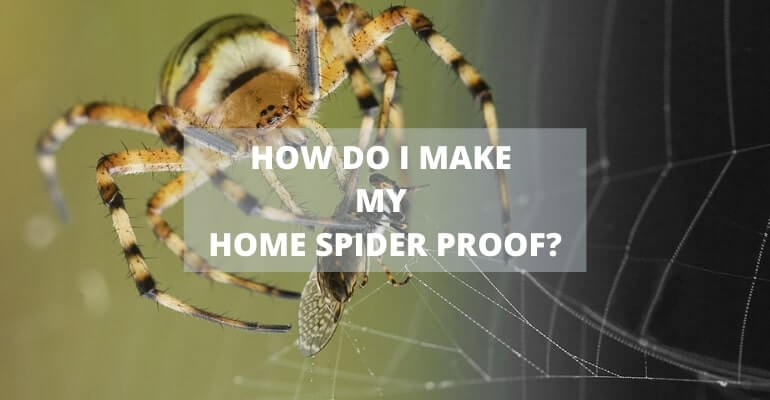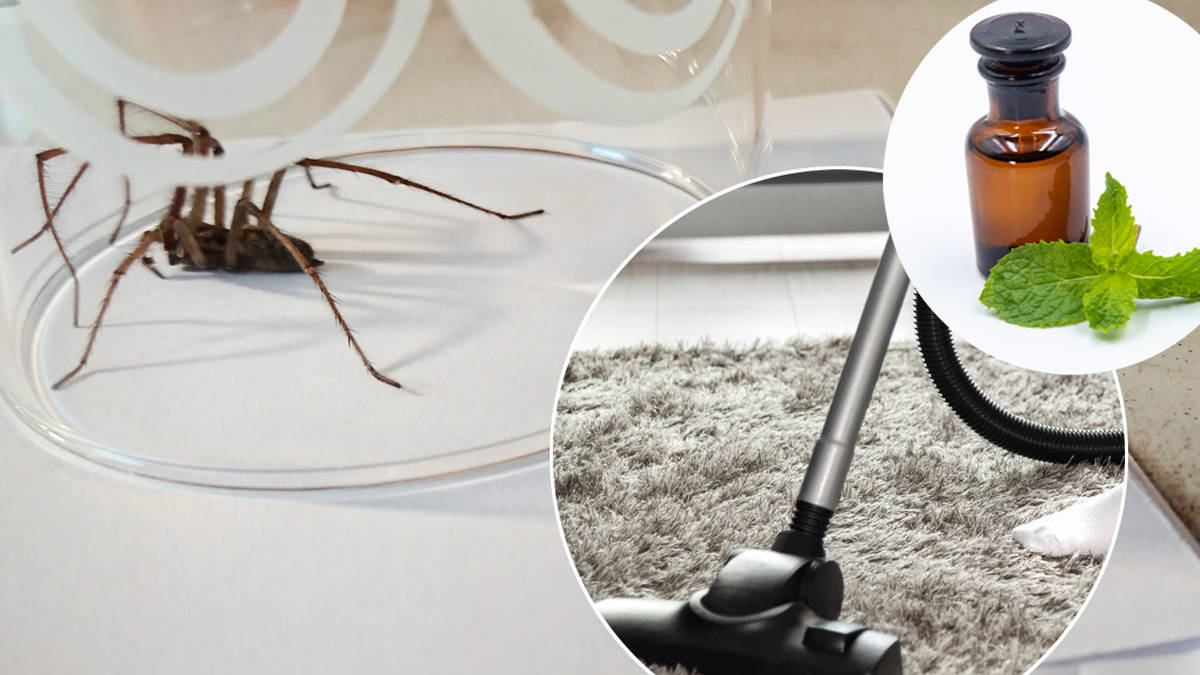Are you afraid of spiders? You’re not alone! But did you know that spiders can actually be helpful to have around? In fact, they can even protect you! These creepy crawlies feast on household pests that can transmit diseases to humans like mosquitoes, fleas, and cockroaches. But should you leave spiders alone if you see them in your home? What’s the friendliest spider out there? And can they sense your fear? In this blog post, we’ll explore these questions and more to help you understand the benefits of having spiders around and how to coexist with them peacefully.

Can spiders be beneficial for humans?
Spiders are commonly known as creepy-crawly creatures that evoke fear and disgust in many people. However, did you know that these eight-legged arachnids can actually be beneficial to humans? Spiders are natural pest control agents that help curtail the spread of diseases by feasting on many household pests that can transmit diseases to humans. Among the pests that spiders prey on are mosquitoes, fleas, flies, cockroaches, and a host of other disease-carrying critters. By consuming these insects, spiders help to reduce their populations, which in turn lowers the risk of diseases being transmitted to humans. Therefore, having spiders around your home can be beneficial in keeping the insect population under control and reducing the risk of disease transmission.
>> Must read Was Daniel Stern really afraid of spiders?
The Surprising Possibility of Spiders Having a Friendly Side
Spiders can be fascinating creatures to observe from a distance, but can they be friendly? While spiders do have the ability to experience certain emotions, such as fear and aggression, they are not capable of forming bonds with humans like a dog or cat would. In fact, spiders are not wired to be companions to humans, and they should never be purchased as pets from pet stores, online, or anywhere else.
While some people may think that they have developed a bond with a spider that they encounter regularly, the reality is that the spider is likely not even aware of their presence. Spiders are solely focused on survival, and their behavior towards humans is typically based on instinct rather than any emotional attachment.
It’s important to remember that spiders are not domesticated animals, and they do not have the same level of socialization or training as pets do. While some species of spiders may appear docile and non-threatening, they can still pose a risk to humans if cornered or provoked.
In conclusion, while spiders may not be capable of forming a bond with humans, they are still fascinating creatures that play an important role in the ecosystem. It’s important to respect their space and avoid handling them whenever possible. Remember, it’s always best to leave spiders alone and let them go about their business.
Trending now – Can rabbits chew through netting?
To Kill or Not to Kill: The Dilemma of Dealing With Spiders
Despite their creepy appearance, spiders are incredibly beneficial to our indoor environment. They act as natural pest control by preying on other insects, such as flies and mosquitoes, that can carry diseases and cause irritation. This makes them an essential part of our ecosystem, not just outdoors, but also inside our homes.
According to Matt Bertone, an entomologist at North Carolina State University, spiders are generally not a danger to humans. In fact, most spiders are shy and avoid humans whenever possible. They only bite when they feel threatened, and even then, their venom is usually not harmful to humans.
Given these facts, it’s best to just leave spiders alone when you come across them in your home. Resist the urge to squash or kill them. Instead, consider them as a natural form of pest control that is helping to keep your home safe and clean.
In addition to their practical benefits, spiders are also fascinating creatures. There are over 40,000 species of spiders worldwide, each with unique characteristics and behaviors. Some spiders even exhibit social behavior and can live in communal groups.
So, the next time you see a spider in your home, take a moment to appreciate it for the valuable role it plays in our ecosystem. If you can’t stand having them inside, consider gently relocating them outside with a cup and a piece of paper. Whatever you do, remember that spiders are not out to get you and are more friend than foe.
Discovering the Spider Species known for being Friendly.
When it comes to spiders, most people tend to associate them with fear and discomfort. However, did you know that not all spiders are dangerous and aggressive? In fact, some of them are even friendly to humans and other spiders. One such spider is the Chikunia bilde, which has been discovered on the Indonesian island of Bali. Researchers were amazed by its unusual behavior, as it displayed a tolerant and friendly demeanor towards humans and other spiders.
The Chikunia bilde is a species of jumping spider that belongs to the Salticidae family. It is relatively small in size, measuring only about 5mm in length. Despite its small size, this spider has a big personality. It is known for its curious and inquisitive nature, often approaching humans without any fear or aggression. Researchers have observed that this spider is unusually tolerant of other spiders as well, even those from different species.
The Chikunia bilde’s friendly behavior is a rare and unique characteristic among spiders. Most spiders tend to be solitary and territorial, often displaying aggression towards other spiders and humans. However, this spider seems to be an exception to the norm. Its behavior towards humans and other spiders is not only friendly but also fascinating to observe.
In conclusion, the Chikunia bilde is a fascinating and friendly spider that has surprised researchers with its unusual behavior. Its tolerance towards humans and other spiders is a rare and unique characteristic, making it one of the friendliest spiders in the world. While most people might still feel uneasy around spiders, it is worth noting that not all spiders are dangerous or aggressive, and some of them can even be friendly companions.
Which Spider Species Exhibits the Most Intelligence?

When it comes to intelligence among spiders, Portia fimbriata, commonly known as the Fringed Jumping Spider or simply as Portia, takes the lead. This spider species is widely recognized as the smartest spider in the world. The Portia spider is a formidable hunter that is capable of modifying its hunting strategies and learning from situations as it encounters them.
What sets Portia apart from other spiders is its ability to solve problems and use trial and error to catch prey. It can identify and remember the behavior of other spiders, which it uses to its advantage during hunts. Portia also has excellent vision and can see in three dimensions, making it an efficient and accurate predator.
Additionally, Portia spiders have been observed to use different techniques to catch their prey depending on the situation. They can mimic the movements of prey insects or even use leaves to hide and ambush their targets. This adaptability and resourcefulness make the Portia spider a fascinating subject of study for scientists.
In conclusion, the Portia spider is undoubtedly the smartest spider in the world, with its exceptional problem-solving skills, learning abilities, and adaptability. Its predatory techniques are an impressive display of intelligence that has captivated the scientific community.
Do Spiders Have an Affinity for You?
Spiders are often misunderstood creatures, and many people believe that they are attracted to humans. However, this is not entirely true. While spiders may sometimes end up on humans, it is not because they are attracted to us. Instead, spiders may be attracted to the warmth that we emit.
It is important to note that spiders do not seek out humans as a source of food or shelter. Rather, they are more likely to be found in areas where their prey is abundant, such as in gardens, basements, or attics. These areas are often dark and undisturbed, which makes them ideal habitats for spiders.
In some cases, spiders may accidentally end up on humans. They may be crawling along a wall or ceiling and fall onto a person as they pass by. Alternatively, they may be hiding in clothing or bedding and inadvertently get carried around by a person.
It is also worth noting that not all spiders are the same. Some species are more likely to be found in homes than others, and some are more likely to be attracted to humans than others. For example, the common house spider is often found in homes and may accidentally end up on humans, while the wolf spider is more likely to avoid humans altogether.
Overall, while spiders may sometimes end up on humans, it is not because they are attracted to us. Rather, they may be attracted to the warmth we emit or simply end up on us accidentally. It is important to remember that spiders play an important role in our ecosystem and should be treated with respect. If you find a spider in your home, consider gently capturing it and releasing it outside rather than killing it.
Are spiders able to detect the fear of humans?
Spiders are fascinating creatures that have long been the subject of myths and folklore. One such myth is that they can sense human fear. Although this theory is yet to be proven, it is likely that spiders can detect fear in humans. The reason being that spiders possess sensory organs that are designed to detect specific stimuli. These organs, known as sensilla, are found on the spider’s legs and are responsible for detecting a variety of environmental cues such as movement, vibrations, and chemicals.
Recent studies have shown that spiders are capable of detecting changes in human behavior, including fear. When a person is afraid, their body releases chemical signals that are picked up by the spider’s sensilla. This allows the spider to sense the presence of danger and respond accordingly. However, it is important to note that these studies are still in their early stages and more research is needed to fully understand the extent of a spider’s ability to detect human fear.
It is also worth noting that not all spiders exhibit the same level of sensitivity to human fear. Some species may be more attuned to these signals than others. For example, a jumping spider, which is known for its excellent vision, may be more likely to detect changes in a person’s behavior than a web-building spider that relies on vibrations to capture its prey.
In summary, while the theory that spiders can sense human fear is still unproven, it is likely that they possess sensory organs that allow them to detect changes in our behavior. Whether or not this ability makes them more likely to attack or avoid us is still up for debate. However, it is important to remember that spiders play an important role in our ecosystem and should be treated with respect and caution.
Why Allowing Spiders to Stay in Your Home is Beneficial.
Is it good to let spiders live?
Many people are scared of spiders and would rather kill them than let them live. However, according to Matt Bertone, an entomologist at North Carolina State University, spiders are actually beneficial to our indoor ecosystem. They help to control the population of other insects, such as flies and mosquitoes, which can be more of a nuisance to humans.
Contrary to popular belief, most spiders are not dangerous to humans. Only a few species, such as the black widow and the brown recluse, have venom that can be harmful. Even then, these spiders are unlikely to bite humans unless they are provoked or feel threatened.
It’s important to remember that spiders are a natural part of our environment. They have been around for millions of years and play an important role in the ecosystem. Killing them can upset the balance of nature and lead to unintended consequences.
In addition, spiders themselves are fascinating creatures. There are over 40,000 species of spiders in the world, each with their own unique characteristics and behaviors. Some spiders are even considered to be friendly, such as the jumping spider, which is known for its curious and playful nature.
Overall, it’s best to just leave spiders alone and let them go about their business. They are not out to harm humans and are actually doing us a favor by controlling the population of other insects. So the next time you see a spider in your home, consider letting it live and appreciating it for the important role it plays in our ecosystem.
Is it Safe to Touch or Handle Spiders?
When it comes to petting spiders, it is not recommended to do so. While it may seem harmless, it is important to remember that all spiders are venomous. Though most spiders do not pose a significant threat to humans, it is still important to exercise caution when handling them. Without proper knowledge, it can be difficult to identify venomous spiders from non-venomous ones.
It is important to keep in mind that spiders are not domesticated animals and do not have the same kind of socialization and training as pets like cats or dogs. Therefore, it is not recommended to pet spiders. Not only can this be dangerous for the handler, but it can also cause stress to the spider.
In general, it is best to observe spiders from a safe distance and avoid handling them as much as possible. If you do need to move a spider, it is recommended to use a jar or container to gently capture and release it outside. This is a safe and humane way to handle spiders without risking harm to yourself or the spider.
In conclusion, while it may be tempting to pet a spider, it is not recommended due to the potential risks involved. It is important to exercise caution and avoid handling spiders unless you are trained and knowledgeable in identifying and handling them safely. By observing spiders from a safe distance and practicing humane methods of relocation when necessary, you can coexist with these fascinating creatures without putting yourself or the spider in harm’s way.
The Dilemma of Choosing Between Killing or Releasing a Spider.
Spiders are commonly found in houses, apartments, and other indoor spaces. While some people find them to be creepy or scary, it’s important to remember that spiders play an important role in controlling the insect population. If you’re one of those people who can’t stand the sight of a spider in your living space, there are humane ways to deal with them. Instead of killing them, try to capture them and release them outside. This is not only a more compassionate approach, but it’s also a more effective one.
When you kill a spider, it doesn’t necessarily solve the problem. Another spider can quickly take its place, and you may end up with even more spiders in your home. On the other hand, if you release the spider outside, it will find a new home and won’t bother you anymore.
It’s also important to remember that having spiders in your home is completely normal. Spiders are attracted to warm, dry environments, which makes our homes the perfect place for them to live. In fact, having spiders around can be beneficial, as they help control the population of other insects in your home.
In conclusion, if you can’t tolerate spiders in your home, try to capture and release them outside instead of killing them. It’s a more humane and effective approach. However, it’s important to remember that having spiders in your home is normal and can even be beneficial. So, the next time you see a spider in your living space, remember that it’s just doing its job and consider letting it live.
Spiders can be extremely beneficial in protecting us from disease-carrying pests. While some people may fear them, it’s important to remember that many spiders are actually friendly and can even be considered intelligent creatures. It’s generally best to leave spiders alone and let them carry out their natural role in keeping our homes and environment free of harmful pests. Killing a spider should be a last resort, as they are an important part of our ecosystem. So, if you want to keep your home healthy and pest-free, it’s a good idea to let spiders live and do their job.




